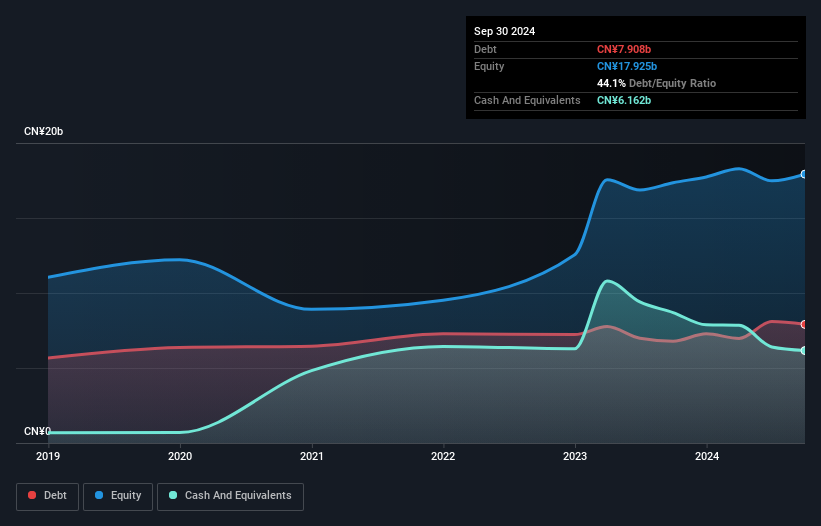- China
- /
- Oil and Gas
- /
- SHSE:600925
These 4 Measures Indicate That Jiangsu Xukuang Energy (SHSE:600925) Is Using Debt Extensively

The external fund manager backed by Berkshire Hathaway's Charlie Munger, Li Lu, makes no bones about it when he says 'The biggest investment risk is not the volatility of prices, but whether you will suffer a permanent loss of capital.' So it seems the smart money knows that debt - which is usually involved in bankruptcies - is a very important factor, when you assess how risky a company is. Importantly, Jiangsu Xukuang Energy Co., Ltd. (SHSE:600925) does carry debt. But the real question is whether this debt is making the company risky.
What Risk Does Debt Bring?
Debt and other liabilities become risky for a business when it cannot easily fulfill those obligations, either with free cash flow or by raising capital at an attractive price. Part and parcel of capitalism is the process of 'creative destruction' where failed businesses are mercilessly liquidated by their bankers. However, a more common (but still painful) scenario is that it has to raise new equity capital at a low price, thus permanently diluting shareholders. Of course, plenty of companies use debt to fund growth, without any negative consequences. When we examine debt levels, we first consider both cash and debt levels, together.
Check out our latest analysis for Jiangsu Xukuang Energy
What Is Jiangsu Xukuang Energy's Net Debt?
You can click the graphic below for the historical numbers, but it shows that as of September 2024 Jiangsu Xukuang Energy had CN¥7.91b of debt, an increase on CN¥6.79b, over one year. However, it also had CN¥6.16b in cash, and so its net debt is CN¥1.75b.

How Healthy Is Jiangsu Xukuang Energy's Balance Sheet?
Zooming in on the latest balance sheet data, we can see that Jiangsu Xukuang Energy had liabilities of CN¥10.5b due within 12 months and liabilities of CN¥10.7b due beyond that. On the other hand, it had cash of CN¥6.16b and CN¥3.76b worth of receivables due within a year. So its liabilities total CN¥11.3b more than the combination of its cash and short-term receivables.
Jiangsu Xukuang Energy has a market capitalization of CN¥34.4b, so it could very likely raise cash to ameliorate its balance sheet, if the need arose. But it's clear that we should definitely closely examine whether it can manage its debt without dilution.
We measure a company's debt load relative to its earnings power by looking at its net debt divided by its earnings before interest, tax, depreciation, and amortization (EBITDA) and by calculating how easily its earnings before interest and tax (EBIT) cover its interest expense (interest cover). Thus we consider debt relative to earnings both with and without depreciation and amortization expenses.
Jiangsu Xukuang Energy has a low net debt to EBITDA ratio of only 0.41. And its EBIT easily covers its interest expense, being 103 times the size. So we're pretty relaxed about its super-conservative use of debt. On the other hand, Jiangsu Xukuang Energy's EBIT dived 13%, over the last year. We think hat kind of performance, if repeated frequently, could well lead to difficulties for the stock. The balance sheet is clearly the area to focus on when you are analysing debt. But it is Jiangsu Xukuang Energy's earnings that will influence how the balance sheet holds up in the future. So if you're keen to discover more about its earnings, it might be worth checking out this graph of its long term earnings trend.
Finally, while the tax-man may adore accounting profits, lenders only accept cold hard cash. So the logical step is to look at the proportion of that EBIT that is matched by actual free cash flow. In the last three years, Jiangsu Xukuang Energy created free cash flow amounting to 5.8% of its EBIT, an uninspiring performance. That limp level of cash conversion undermines its ability to manage and pay down debt.
Our View
While Jiangsu Xukuang Energy's EBIT growth rate has us nervous. To wit both its interest cover and net debt to EBITDA were encouraging signs. We think that Jiangsu Xukuang Energy's debt does make it a bit risky, after considering the aforementioned data points together. That's not necessarily a bad thing, since leverage can boost returns on equity, but it is something to be aware of. Over time, share prices tend to follow earnings per share, so if you're interested in Jiangsu Xukuang Energy, you may well want to click here to check an interactive graph of its earnings per share history.
If, after all that, you're more interested in a fast growing company with a rock-solid balance sheet, then check out our list of net cash growth stocks without delay.
New: Manage All Your Stock Portfolios in One Place
We've created the ultimate portfolio companion for stock investors, and it's free.
• Connect an unlimited number of Portfolios and see your total in one currency
• Be alerted to new Warning Signs or Risks via email or mobile
• Track the Fair Value of your stocks
Have feedback on this article? Concerned about the content? Get in touch with us directly. Alternatively, email editorial-team (at) simplywallst.com.
This article by Simply Wall St is general in nature. We provide commentary based on historical data and analyst forecasts only using an unbiased methodology and our articles are not intended to be financial advice. It does not constitute a recommendation to buy or sell any stock, and does not take account of your objectives, or your financial situation. We aim to bring you long-term focused analysis driven by fundamental data. Note that our analysis may not factor in the latest price-sensitive company announcements or qualitative material. Simply Wall St has no position in any stocks mentioned.
About SHSE:600925
Jiangsu Xukuang Energy
Engages in the coal mining, washing, and processing.
Excellent balance sheet second-rate dividend payer.
Market Insights
Community Narratives



